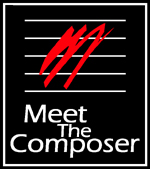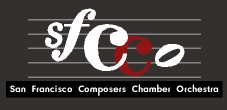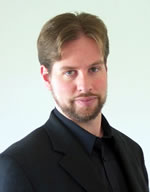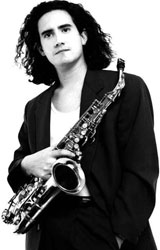| SAN
FRANCISCO COMPOSERS CHAMBER ORCHESTRA |
|
Brian Holmes is a physics professor at San Jose State University, specializing in the physics of musical instruments. He usually composes for voice or chorus. During the last year, he has completed commissions for the Peninsula Women's Chorus, the Peninsula Girls Chorus, Pinewood School, and Castileja School. His opera The Fashion God was performed last May by Fresh Voices VI; the song cycle Updike's Science will be performed by Lara Bruckmann as part of Fresh Voices VII later this month. Next weekend, the San Jose Symphonic Choir will perform two pieces of his in Palo Alto as part of a NACUSA concert; one is a premier. |
Two
Grotesque Songs from Death's Jest-Book |
John Beeman studied with Peter Fricker and William Bergsma at the University of Washington where he received his Master's degree. His first opera, The Great American Dinner Table was produced on National Public Radio. Orchestral works have been performed by the Fremont-Newark Philharmonic, Santa Rosa Symphony, and the Peninsula Symphony. The composer's second opera, Law Offices, premiered in San Francisco in 1996 and was performed again in 1998 on the steps of the San Mateo County Courthouse. Concerto for Electric Guitar and Orchestra was premiered in January 2001 by Paul Dresher, electric guitar. Mr. Beeman has attended the Ernest Bloch Composers' Symposium, the Bard Composer-Conductor program, the Oxford Summer Institutes, and the Oregon Bach Festival and has received awards through Meet the Composer, the American Music Center and ASCAP. Compositions have been performed by Ensemble Sorelle, the Mission Chamber Orchestra, the Ives Quartet, Fireworks Ensemble, the Oregon Repertory Singers and Schola Cantorum of San Francisco. |
Fire Suite |
|
Loren Jones began experimenting with composition as a child. He spent his early years dividing his time between film-making and music, and some of his film work was periodically broadcast on local San Francisco television. Eventually choosing to pursue music instead of film, Loren formed and was part of several bands performing and creating different genres of original music. To this point largely self-taught, in the 1980's Loren returned to serious study to acquire greater depth musical education in order be able to create the kind of music that he had always been the most passionate about. Loren has studied with Tom Constantine, Alexis Alrich and is currently working with David Conte at the San Francisco Conservatory of Music, where he is also a member of the chorus. His music has been performed by his own chamber group, by the San Francisco Composers Chamber Orchestra, and by students and teachers from around the Bay Area. He has produced several recordings, worked in radio and film, including creating the sound track for an animated short which won a special Academy Award. His 2006 release, Woodward's Gardens, features two guitars, piano, flute, oboe, harp, and cello. He was the recipient of a 2007 Meet the Composer Grant. His project, Dancing on the Brink of the World, a fourteen movement piece for chamber orchestra and period instruments, on the history of San Francisco, has been an ongoing part of the repertoire of the past three seasons of SFCCO concerts. |
Dancing On the Brink of the
World San Francisco - 1600 to The Present
|
|
The multi-instrumentalist Michael Cooke is a composer of jazz and classical music. This two-time Emmy, ASCAPLUS Award and Louis Armstrong Jazz Award winner plays a variety of instruments: you can hear him on soprano, alto, and tenor saxophones, flute, soprano and bass clarinets, bassoon and percussion. A cum laude graduate with a music degree from the University of North Texas, he had many different areas of study; jazz, ethnomusicology, music history, theory and of course composition. In 1991 Michael began his professional orchestral career performing in many north Texas area symphonies. Michael has played in Europe, Mexico, and all over the United States. Cimarron Music Press began published many of Michael's compositions in 1994. After relocating to the San Francisco Bay Area, he has been exploring new paths in improvised and composed music, mixing a variety of styles and techniques that draw upon the creative energy of a multicultural experience, both in and out of America. In 1999, Michael started a jazz label called Black Hat Records (blackhatrecords.com) and is currently on the Board of Directors of the San Francisco Composers Chamber Orchestra. The San Francisco Beacon describes Michael's music as "flowing out color and tone with a feeling I haven't heard in quite a while. Michael plays with such dimension and flavor that it sets (his) sound apart from the rest." Uncompromising, fiery, complex, passionate, and cathartic is how the All Music Guide labeled Michael's playing on Searching by Cooke Quartet, Statements by Michael Cooke and The Is by CKW Trio. His latest release, An Indefinite Suspension of The Possible, is an unusual mixture of woodwinds, trombone, cello, koto and percussion, creating a distinct synergy in improvised music that has previously been untapped. |
Ha-Me'aggel (one who draws circles) for Orchestra * Jonathan Russell writes music for a wide variety of ensembles, from orchestra to chorus to rock band. His works have been performed by numerous ensembles, including the San Francisco Symphony, Berkeley Symphony, Harvard-Radcliffe Orchestra, Woodstock Chamber Orchestra, Empyrean Ensemble, the new music bands FIREWORKS and Capital M, and pianists Sarah Cahill and Lisa Moore. Important influences on his work include Johannes Brahms, Gustav Mahler, Igor Stravinsky, Olivier Messiaen, Charles Mingus, Steve Reich, Guns N' Roses, Radiohead, Cornelius Boots, Ryan Brown, Ben Gribble, klezmer music, and free improvisation. Also active as a performer on clarinet, bass clarinet, and alto saxophone, Jonathan is a member of the heavy-metal inspired Edmund Welles bass clarinet quartet and the Balkan/Klezmer/Experimental band Zoyres. He also plays in, composes for, and is a founding member of the Sqwonk bass clarinet duo, and freelances in the Bay Area as a classical and klezmer clarinetist. Jonathan teaches Theory and Musicianship at the San Francisco Conservatory of Music, serves as Music Director at First Congregational Church, San Francisco, and is a critic for the San Francisco Classical Voice. He has a BA in Music from Harvard University and an MM in Composition from the San Francisco Conservatory of Music. His composition teachers have included Dan Becker, Elinor Armer, Eric Sawyer, John Stewart, and Eric Ewazen. Alexis Alrich is presently living in Hong Kong but visits the Bay Area frequently. Her Marimba Concerto, which was presented by the SFCCO, will be played by the Plymouth Symphony in Plymouth, Michigan in 2009 with conductor Nan Washburn. Her piece Island of the Blue Dolphins was performed by the Santa Barbara Symphony on January 19, 2007. She attended an artists' colony in 2007, I-Park in Connecticut, where she wrote Fragile Forests II: Cambodia, next in the series after Fragile Forests I: California Oaks, which was premiered in December 2006 by the San Francisco Composers Orchestra. As one of the winners of a Continental Harmony grant from the American Composers Forum she has written a piece for chorus, orchestra and soloists for the state of Maine. Avenues, her first orchestra piece, was premiered by the Women's Philharmonic and has been played around the country. Her chamber compositions have been performed by members of the San Francisco ballet, opera and symphony orchestras and ensembles including Bay Brass, City Winds, the Ahlert and Schwab guitar and mandolin duo in Germany, the Ariel Ensemble, New Release Alliance and Earplay in San Francisco. Ms. Alrich is the director of the John Adams Young Composers program in Berkeley, California. This is an intensive training program for composers ages 9-18 in honor of and under the aegis of John Adams. Victor Flaviani, Timpani |
Harry Bernstein has been involved in San Francisco Bay Area music for many years as a composer, performer and teacher. He began his musical training on the trumpet, later learning the recorder as well as the Baroque the modern flutes. More recently, his life has been altered by the invasion of a viola. This occurred a few years after Bernstein began his association with City College. Why take up a stringed instrument in one's fifties? In his case, he took on the challenge of learning the viola in order to explore both orchestral and chamber music, and to learn how to write more effectively for strings. Not long after earning a D.M.A. in early music performance from Stanford University, he moved 30 miles north to San Francisco where he has lived ever since. He has studied composition with Jerry Mueller and has written vocal and instrumental music. Bernstein is co-founder of the Golden Age Ensemble, a duo presenting varied programs of instrumental and vocal music around the Bay Area and is a partner in Micro Pro Musica Press, SF, which offers music engraving, arranging and transcription services. He is currently active with the San Francisco Composers Chamber Orchestra (flute), the Bay Area Rainbow Symphony (viola), and that unpredictable composers' circle known as Irregular Resolutions. Bernstein is an instructor in both the Music and Older Adults Departments at City College of San Francisco, and also teaches privately. |
Grace under Fire * |
Gary Friedman was born in 1934 and raised in University Heights, a suburb of Cleveland, Ohio, Gary Friedman received his higher education at Antioch College, The University of Chicago (B.S. and M.D. degrees), and Harvard University (M.S. degree). His main career has been as a physician-epidemiologist. He worked in the Kaiser Permanente Division of Research for 30 years including 7 years as its Director. Since retiring from Kaiser Permanente in 1999, his current position is Consulting Professor, Stanford University School of Medicine. Dr. Friedman's musical education started with piano at age 5. He also played trumpet in junior high and high school and studied organ and music theory during teen age. Playing and improvising on the piano only occasionally during adulthood, he returned to music seriously at age 54, studying oboe and English horn with Janet Popesco Archibald. He currently plays these instruments in the San Francisco Civic Symphony, the College of Marin Symphony, the Bohemian Club Band and chamber groups. Starting at age 64, he studied composition for four years with Alexis Alrich in the Adult Extension Division of the San Francisco Conservatory of Music. His musical compositions, mostly chamber works, are described in his music web site www.garyfriedmanmusic.net. |
Trumpet Concerto *
|
Allan Crossman has written for many soloists and ensemble. The North/South Consonance (NYC) recording of Millennium Overture Dance received a GRAMMY nomination in 2003; Music for Human Choir (SATB) shared Top Honors at the Waging Peace through Singing Festival; North/South recently recorded his FLYER (cello and string orchestra, with soloist Nina Flyer); and a recent commission is the piano trio Icarus, for the New Pacific Trio (San Francisco). One of his many theatre scores, The Log of the Skipper's Wife, was produced by the Royal Shakespeare Company at Stratford and the Kennedy Center, with Crossman's music drawn from Irish/English shanties and dances. His music is the soundtrack for the award-winning animated short, X man, by Christopher Hinton (National Film Board of Canada). His work has been supported by such organizations as Canada Council for the Arts, American Composers Forum, and Meet the Composer (NY). Professor Emeritus, Concordia University (Montreal), he has also taught at Wheaton College, the Pacific Conservatory, and is presently on the faculty of the San Francisco Conservatory of Music. His doctoral studies were with George Rochberg, George Crumb, and Hugo Weisgall at the University of Pennsylvania. |
|
| *These
pieces were made possible by a Creative Connections Award from Meet
The Composer.
|
|
| Flute Oboe Jon Russell ** Alto Saxophone
Bassoon
(ContraBassoon**) |
French
Horn Trumpet Trombone Euphonium Piano |
Violin I Hande Erdem Viola Cello Bass
|



 Dr. Mark Alburger was the Music Director, Conductor, and founder of the San Francisco Composers Chamber Orchestra. Mark was an eclectic American composer known for his postminimal, postpopular, and postcomedic sensibilities. He served as the Music Director of Goat Hall Productions / San Francisco Cabaret Opera, Editor-Publisher of 21st-Century Music Journal, an award-winning ASCAP composer of concert music published by New Music, an Instructor in Music Theory and Literature at Diablo Valley College, a Music Critic for Commuter Times, an author, musicologist, oboist, pianist, and recording artist.
Dr. Mark Alburger was the Music Director, Conductor, and founder of the San Francisco Composers Chamber Orchestra. Mark was an eclectic American composer known for his postminimal, postpopular, and postcomedic sensibilities. He served as the Music Director of Goat Hall Productions / San Francisco Cabaret Opera, Editor-Publisher of 21st-Century Music Journal, an award-winning ASCAP composer of concert music published by New Music, an Instructor in Music Theory and Literature at Diablo Valley College, a Music Critic for Commuter Times, an author, musicologist, oboist, pianist, and recording artist. John Kendall Bailey is an Associate Conductor with the San Francisco Composers Chamber Orchestra and is Principal Conductor and Chorus Master of the Trinity Lyric Opera, Music Director and Conductor of Voices of Musica Sacra, and Artistic Director of the San Francisco Song Festival. In 1994, Mr. Bailey founded the Berkeley Lyric Opera and served as its Music Director and Conductor until 2001. Since then he has been a guest conductor with the Oakland East Bay Symphony, Oakland Youth Orchestra, and Oakland Ballet, and music director and conductor for productions with North Bay Opera, Mission City Opera, Goat Hall Productions, Solo Opera, the Crowden School and Dominican University. From 2002-2006 he was the Chorus Master of the Festival Opera of Walnut Creek. Mr. Bailey is also a composer, and his works have been performed and commissioned in the Bay Area and abroad.
John Kendall Bailey is an Associate Conductor with the San Francisco Composers Chamber Orchestra and is Principal Conductor and Chorus Master of the Trinity Lyric Opera, Music Director and Conductor of Voices of Musica Sacra, and Artistic Director of the San Francisco Song Festival. In 1994, Mr. Bailey founded the Berkeley Lyric Opera and served as its Music Director and Conductor until 2001. Since then he has been a guest conductor with the Oakland East Bay Symphony, Oakland Youth Orchestra, and Oakland Ballet, and music director and conductor for productions with North Bay Opera, Mission City Opera, Goat Hall Productions, Solo Opera, the Crowden School and Dominican University. From 2002-2006 he was the Chorus Master of the Festival Opera of Walnut Creek. Mr. Bailey is also a composer, and his works have been performed and commissioned in the Bay Area and abroad.  Michael Cooke is the Promotion & Fundraising Director of the San Francisco Composers Chamber Orchestra and a composer of jazz and classical music. This two-time Emmy and Louis Armstrong Jazz Award winner plays a variety of instruments: you can hear him on soprano, alto, and tenor saxophones, flute, soprano and bass clarinets, bassoon and percussion. A cum laude graduate with a music degree from the University of North Texas, he had many different areas of study; jazz, ethnomusicology, music history, theory and of course composition. In 1991 Michael began his professional orchestral career performing in many north Texas area symphonies. Michael has played in Europe, Mexico, and all over the United States. Cimarron Music Press began published many of Michael's compositions in 1994.
Michael Cooke is the Promotion & Fundraising Director of the San Francisco Composers Chamber Orchestra and a composer of jazz and classical music. This two-time Emmy and Louis Armstrong Jazz Award winner plays a variety of instruments: you can hear him on soprano, alto, and tenor saxophones, flute, soprano and bass clarinets, bassoon and percussion. A cum laude graduate with a music degree from the University of North Texas, he had many different areas of study; jazz, ethnomusicology, music history, theory and of course composition. In 1991 Michael began his professional orchestral career performing in many north Texas area symphonies. Michael has played in Europe, Mexico, and all over the United States. Cimarron Music Press began published many of Michael's compositions in 1994.